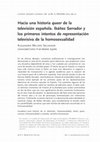Papers by Alejandro Melero Salvador

Anàlisi, 2011
Following the recent and vivid dialogue around the relevant role of the media in the Spanish tran... more Following the recent and vivid dialogue around the relevant role of the media in the Spanish transition to democracy, this article studies the irst representations of homosexual characters
in the democratic cinema, focusing on the importance of the question of education, of great signiicance for the LGTB activism of the time. It refers to different theoretical sources, including
signiicant works of queer and gender theorists and archival material of the gay activism of the late Francoism. It studies how the irst activism aimed to prove wrong old myths around
homosexuality and to convince the new democratic society of the importance of the acceptance of sexual diversity, and how the so-called strategy of the «Trojan horse» was used in order to introduce, making use of the media, educational messages. The ilm Los placeres ocultos is taken as a case study to examine the legacy of the connection between education and LGTB liberation
in cinema; the analysis is helpful to explore the dificulties of the use of ilm narratives with educational intentions, as well as to understand the irst steps in the creation of innovative
discourses of little tradition in Spanish culture.
Cuadernos Tecmerin, Universidad Carlos III de Madrid, 2014
Journal of Homosexuality, 2013
This article studies the representation of gay men in Spanish comedies of the 1970s. It analyzes ... more This article studies the representation of gay men in Spanish comedies of the 1970s. It analyzes how cinema used the stereotypical image of gay men projected by the dictatorship and how, once it ended, this image endured in the comedy genre. It introduces film theories on the construction of humor taken from relevant authors, such as Jordan, Charney, Voitylla, and Petri. Afterward, it focuses on the works of Ozores as a filmmaker who encapsulates the main characteristics of the so-called comedia de mariquitas (sissy comedy). It analyzes how the construction of humor was based on the Francoist conception of gay men, and questions why the figure of the gay man was so effective in the production of comedy. Finally, this article refers to Dyer's theories around stereotyping, and develops them to study the Spanish context.

Hispanic Research Journal, Dec 13, 2013
En las últimas décadas, numerosas publicaciones e investigaciones han demostrado la valía de los ... more En las últimas décadas, numerosas publicaciones e investigaciones han demostrado la valía de los estudios queer televisivos, que empezaron como una disciplina dependiente de otras y han acabado por convertirse en una rama de estudio con entidad propia. El hecho de que en España su impact o haya sido mínimo hasta la fecha no hace sino demostrar la urgencia y necesidad de incorporarlos a la agenda académica para la creación de una historia queer de la televisión española. Este artículo estudia la obra de Narciso Ibáñez Serrador, centrándose en Historia de la frivolidad (1967), para tomarla como ejemplo de los primeros pasos de las representaciones televisivas de minorías sexuales en España. Tras presentar algunas de las teorías más relevantes sobre los estudios de televisión queer, el texto analiza distintos momentos de Historia de la frivolidad para acabar centrándose en dos de ellos, que son muy significativos de dos cuestiones fundamentales en esta clase de estudios: la representación del beso entre dos personas del mismo sexo y el uso de personajes homosexuales con intenciones cómicas. Finalmente, se presta atención a la desconocida pieza Aprobado en inocencia (1964), de Ibáñez Serrador, para complementar el estudio sobre las posibilidades narrativas que este hombre de televisión encontraba en la homosexualidad. 1 palabras clave historia de la televisión, homosexualidad, teoría queer, censura, homosexualidad y comedia, narrativa homosexual 1 Este artículo es el resultado del trabajo dentro del Grupo de Investigación TECMERIN (Televisión y cine: memoria, representación, industria) del Departamento de Periodismo y Comunicación Audiovisual de la Universidad Carlos III de Madrid y del Proyecto de Investigación 'Los medios audiovisuales en la Transición española. Las imágenes del cambio democrático', CSO2009-09291, Ministerio de Ciencia e Innovación. Estoy especialmente agradecido a mi compañera Concepción Cascajosa por guiarme hasta el texto Aprobado en inocencia.
Revista de estudios culturales. Torre del Virrey, 2011
Michel Foucault’s theories have inspired Gay and Lesbian scholars of the last three decades, and ... more Michel Foucault’s theories have inspired Gay and Lesbian scholars of the last three decades, and has been applied in different fields, such as Cultural Studies and Historiography. The peculiarities of the Spanish case, which included one of the harshest repressions in the 1970s, before becoming one of the first nations to recognise equality, demands reviewing the most recent past so as to include new perspectives that document and clarify the early years of the democracy in order to develop
a solid theoretical frame for queer cultures. This article addresses Foucault´s theories and, after analysing medical and legal Francoist texts, suggests some key concepts to approach these first years of the Spanish homosexual liberation.
Parejas de baile. Insituto Cervantes., 2012
Book Reviews by Alejandro Melero Salvador
La torre del Virrey. Revista de Estudios Culturales, 7, 2010/3, 2010
Hispanic Research Journal, Jun 2007
New Cinemas. Journal of Contemporary Film, Nov 3, 2012
Odisea. N. 2, pp. 211-217, 2002











Uploads
Papers by Alejandro Melero Salvador
in the democratic cinema, focusing on the importance of the question of education, of great signiicance for the LGTB activism of the time. It refers to different theoretical sources, including
signiicant works of queer and gender theorists and archival material of the gay activism of the late Francoism. It studies how the irst activism aimed to prove wrong old myths around
homosexuality and to convince the new democratic society of the importance of the acceptance of sexual diversity, and how the so-called strategy of the «Trojan horse» was used in order to introduce, making use of the media, educational messages. The ilm Los placeres ocultos is taken as a case study to examine the legacy of the connection between education and LGTB liberation
in cinema; the analysis is helpful to explore the dificulties of the use of ilm narratives with educational intentions, as well as to understand the irst steps in the creation of innovative
discourses of little tradition in Spanish culture.
a solid theoretical frame for queer cultures. This article addresses Foucault´s theories and, after analysing medical and legal Francoist texts, suggests some key concepts to approach these first years of the Spanish homosexual liberation.
Book Reviews by Alejandro Melero Salvador
in the democratic cinema, focusing on the importance of the question of education, of great signiicance for the LGTB activism of the time. It refers to different theoretical sources, including
signiicant works of queer and gender theorists and archival material of the gay activism of the late Francoism. It studies how the irst activism aimed to prove wrong old myths around
homosexuality and to convince the new democratic society of the importance of the acceptance of sexual diversity, and how the so-called strategy of the «Trojan horse» was used in order to introduce, making use of the media, educational messages. The ilm Los placeres ocultos is taken as a case study to examine the legacy of the connection between education and LGTB liberation
in cinema; the analysis is helpful to explore the dificulties of the use of ilm narratives with educational intentions, as well as to understand the irst steps in the creation of innovative
discourses of little tradition in Spanish culture.
a solid theoretical frame for queer cultures. This article addresses Foucault´s theories and, after analysing medical and legal Francoist texts, suggests some key concepts to approach these first years of the Spanish homosexual liberation.